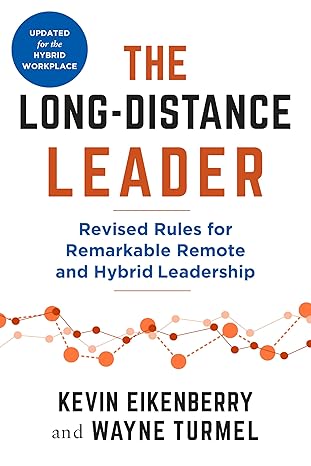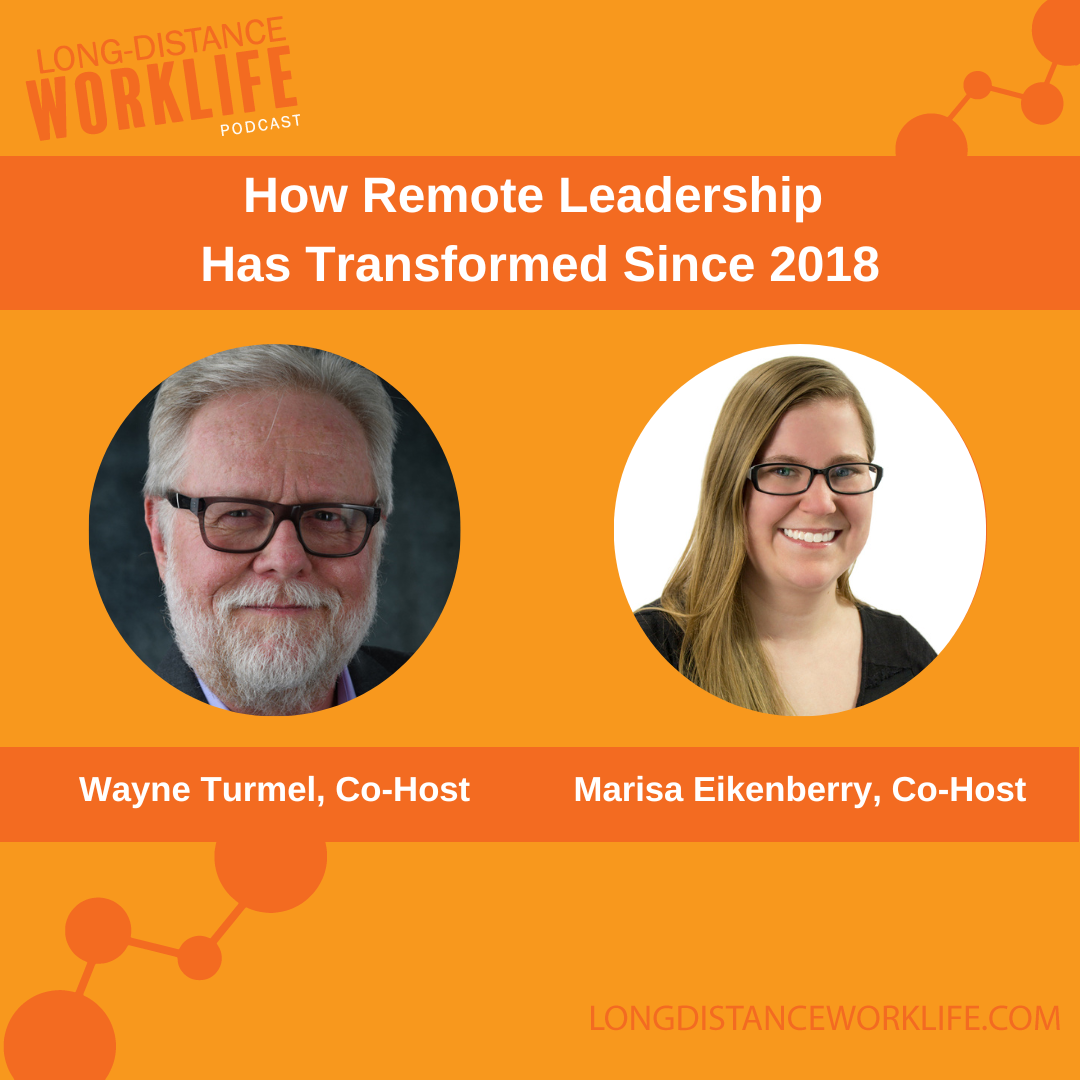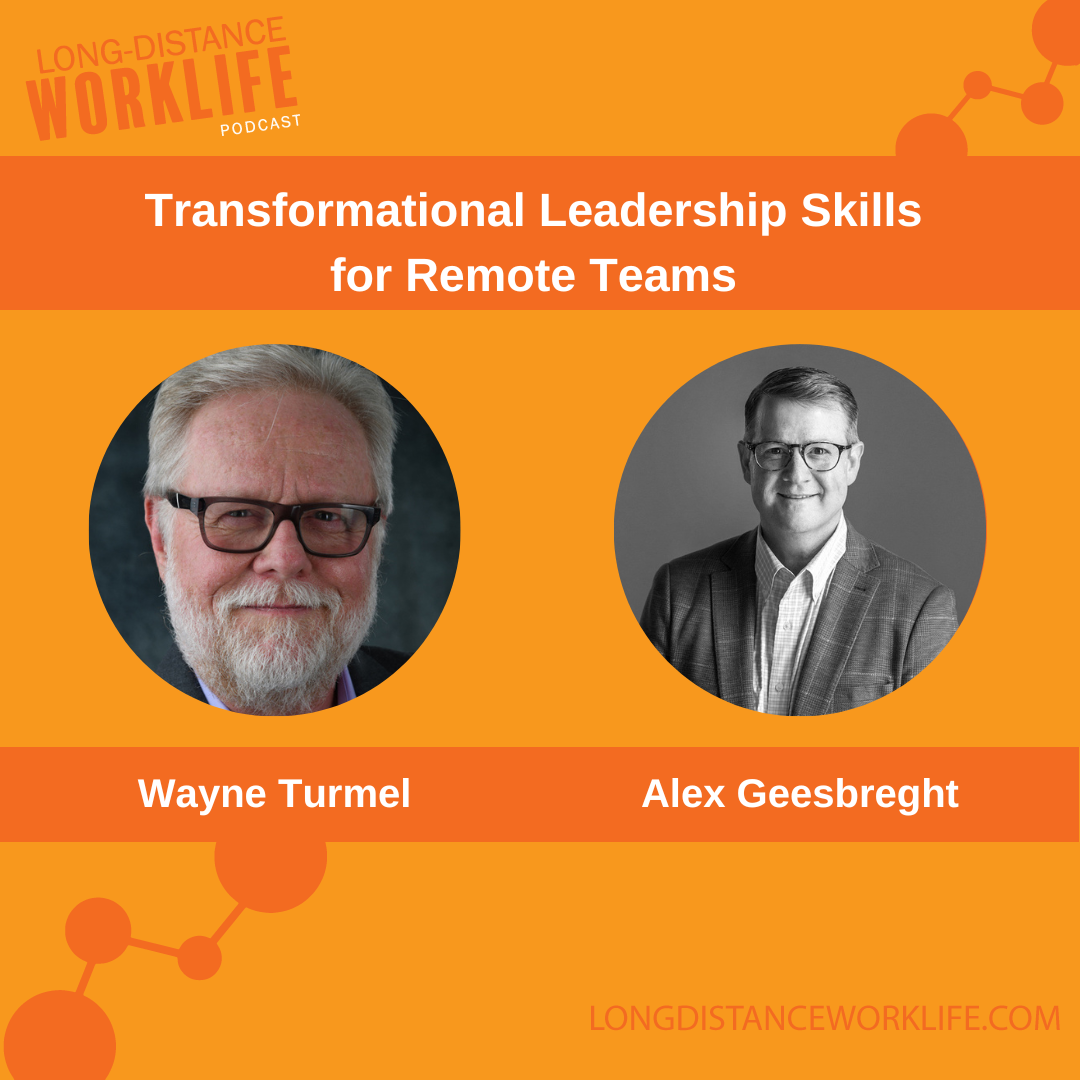Remote leadership comes with its own set of challenges, especially when managing a global team. Anatoliy Labinskiy, CEO of GSM Growth Agency, shares his journey of building a successful remote company from the ground up. In this episode of The Long-Distance Worklife, Wayne Turmel delves into Anatoliy’s unique approach to fostering productivity, maintaining psychological safety, and navigating the complexities of international hiring. Whether you're leading a team or working remotely, Anatoliy’s strategies offer valuable lessons for thriving in today’s digital work environment.
Key Takeaways
1. Understanding Team Motivations: Anatoliy Labinskiy emphasizes the importance of aligning company goals with individual team members' personal aspirations. By understanding what drives each employee, leaders can foster a more motivated and committed workforce.
2. Flexibility and Accountability: GSM Growth Agency operates without strict schedules, instead focusing on task completion and results. This flexible approach, combined with a commission-based compensation model, ensures that team members are accountable and driven to achieve their goals.
3. Psychological Safety is Crucial: Creating an environment where remote employees feel safe to express concerns and challenges is vital. Anatoliy highlights the role of managers in maintaining psychological safety and supporting their team’s well-being.
4. Data-Driven Management: Using data and KPIs to monitor performance allows leaders to proactively address issues and provide support where needed. This approach helps in maintaining high standards and quickly identifying areas that require attention.
5. Challenges of International Hiring: Managing a global remote team comes with legal and tax complexities. However, the benefits of accessing a diverse talent pool far outweigh these challenges. Anatoliy suggests that focusing on skills and mentality rather than geographic location leads to better hiring decisions.
6. Remote Work Evolution: The landscape of remote work is continually evolving, with companies increasingly adopting global teams. Anatoliy predicts that future regulations will likely adapt to this new reality, making it easier for businesses to operate internationally.
00;00;08;17 - 00;00;39;04
Wayne Turmel
Hi, everybody. Welcome to another episode of The Long Distance Worklife, the podcast where we try to make sense and help you thrive, survive, generally keep the weasels at bay in the world of remote and hybrid work. And today we are going to take a slightly different approach than we often do. And in order to do that, I am going to bring in this week's guest, Anatoly Levinsky.
00;00;39;04 - 00;00;45;00
Wayne Turmel
Anatoly is with GSM growth. Anatoly, how are you, sir?
00;00;45;03 - 00;00;57;25
Anatoliy Labinskiy
Yeah. I'm really great. I'm I'm happy to be here and excited to share my experience. Hopefully there at least one person on list, and then it'll be, like something useful for him.
00;00;57;27 - 00;01;10;18
Wayne Turmel
Yeah. Exactly. Right. So help us, what is GSM growth? What do you do. And why are you kind of so happy to talk about remote work?
00;01;10;21 - 00;01;49;02
Anatoliy Labinskiy
Yeah, sure. Like basically we are advertise as an agency, GSM Growth Agency, where we are focusing on building advertising ecosystem for the Shopify brand owners by managing the Facebook, TikTok, Google, Snapchat, SMS, email marketing. So building the IC ecosystem machine for the brand owners in terms of advertising, and it's helping to increase long term inventory of of the customers and at the same time protecting if something happens to Facebook or TikTok or Google, other platforms are covering and like keeping going.
00;01;49;09 - 00;02;08;15
Anatoliy Labinskiy
So basically that's the main focus. We are what we are doing. We are doing that, since 2000, 17, in general on my stores, I started and after that, by the beginning of 2020, we opened the agency and done quite successfully in last couple of years, we generated over 33 million for customers in the profitable sales.
00;02;08;18 - 00;02;46;15
Wayne Turmel
So clearly your company works and it works remotely. I know you're in Portugal this morning and you're going to be in Miami tomorrow, and I'm in Las Vegas. And isn't technology wonderful? But let's talk because on this show we usually talk to the individual contributor or the individual line manager. But a lot of organizations are struggling making remote work happen because the CEO isn't either, isn't 100% bought in or doesn't know how to support remote work effectively.
00;02;46;15 - 00;03;04;09
Wayne Turmel
And that's the conversation I'd like to have with you. So why don't we start with, as the CEO of a company, what are the things about remote work specific that you are most concerned about?
00;03;04;10 - 00;03;43;00
Anatoliy Labinskiy
Yeah, sure. I would say like definitely remote work. We are like, we work on the top, quantity. It was 44 team members. Now we are around 35. And basically the main thing was for, understanding how to manage them, how to make sure that they are doing the work during the, like the remote, remote stay in remote year, like how to understand that they are not going to the refrigerator or watching Netflix and instead of doing the, specific, tasks and, we create the system, like, I create the system.
00;03;43;00 - 00;04;06;24
Anatoliy Labinskiy
At the beginning, when I had no managers, I had a couple of employers. And we start growing so fast in 2020 that I start, actually giving opportunities to the average worker to become a manager. And this is where we start growing as a company, and we start building the management system. Number one thing, which is, I believe on the remote work, very important is understanding what actually your team mates want.
00;04;07;01 - 00;04;25;17
Anatoliy Labinskiy
Like I was doing mistake in the first half of the year. I was always sharing my vision. I'm with the CEO, I'm the founder, I have a vision where I want to bring the company, I know my why and I'm just sharing that why and that vision with my team. You know what? They agreed. But it doesn't mean that they agreed.
00;04;25;17 - 00;04;29;18
Anatoliy Labinskiy
Actually, they agreed because I'm paying them for, you know, so of course they will do.
00;04;29;21 - 00;04;32;12
Wayne Turmel
The job is smiling not at the boss.
00;04;32;12 - 00;04;53;23
Anatoliy Labinskiy
Right, exactly. But after that, I decided to make the difference. And I started speaking to the top management. And like, guys, what's important for you? Where you want to be in couple of years? How you want to use the GSM to achieve your own goals. What's your actual goals? And this is where was the game changer in terms of management, the team.
00;04;53;23 - 00;05;19;28
Anatoliy Labinskiy
Because when they start understanding what they want, we start moving forward to implement our possible, features in the company to achieve their goals. And by that being said, I start always using one quote. I use the GSM as a tool to achieve your own goals, and GSM will be great as well because if they tune their own goals means just how much you in their it's own as well.
00;05;20;00 - 00;05;42;04
Anatoliy Labinskiy
So basically it create extreme ownership for each individual person on that side of the phone, on that side of the zoom, from from the management side of implementing the things which need to be implemented and need to be done. And basically they motivated to train the other team members to make sure that they will achieve results, whatever it takes.
00;05;42;06 - 00;06;01;24
Wayne Turmel
Okay. I'm going to stop you there. it clearly ownership is an important piece of this. Can you give me a specific example of something where your vision or what you wanted differed from what another person wanted and how you worked through that?
00;06;01;26 - 00;06;23;13
Anatoliy Labinskiy
Yeah, sure. It's not about human difference because, especially at the first years. Yeah. The first couple of years of the company, everyone had quite similar, targets, which is what financial targets to achieve. And basically, for me, I was creating the company without the basics. So it is all in the commission's. Why one of the part because it I was a startup.
00;06;23;13 - 00;06;42;20
Anatoliy Labinskiy
Secondly, because it's a remote work. I don't want to pay anyone basics because I don't want what you I don't want like running behind him and asking, have you done that? Have you done that? He has a commission base. Every single team members have the commission base income. So if, he wants to get money this month, he need to complete the task.
00;06;42;22 - 00;07;00;20
Anatoliy Labinskiy
It's that simple. We don't have, like, 9 to 5. We don't have 2 to 12. We don't have that. We have like, hey, like, this is the task. So it has to be done in one hour. It has to be done before I know the day before the end of the week and the tasks are done because like if it's not done, there is a questions what's happen?
00;07;00;22 - 00;07;26;19
Anatoliy Labinskiy
And basically like we create the financial matrix where we seen all those, like metrics and create the KPIs to the metrics of achievements of every single media buyer, every single salesperson manager. And after that, when we see that somewhere the numbers are going slightly down from the the record requirements, we can understand that something emotionally, mentally could be wrong or just person quit or whatever.
00;07;26;21 - 00;07;43;10
Anatoliy Labinskiy
And that's why we start working on the psychological part, which is we really care. We start our management, start, reaching out instantly when they see that, okay, in the last couple of days, metrics are down. What's happening? They reaching out and asking, hey, like, is everything okay? You know.
00;07;43;16 - 00;08;16;15
Wayne Turmel
So I you said a couple of things there that I think we need to we need to make sure that we address. One of them is just systematic, the notion of and whether somebody is on base plus commission or whatever or whatever the metrics are based on outcomes, they're not based on behavior, right? Whether somebody spends 12 hours a day at their keyboard or five hours a day, it's measured by output, right?
00;08;16;15 - 00;08;43;28
Wayne Turmel
It's measured by did you make the sales or the deals being closed, whatever that defining the metrics is really important. The second thing is less systemic, and you kind of glossed over it, but I think it's important. And that is the notion of the psychological safety and managers having their radar up to know that something is up.
00;08;44;01 - 00;09;07;06
Anatoliy Labinskiy
Yeah. the that's like that's kind of right there. Because before last one and half, two years, we were running without those metrics. I had my own Excel sheets and I was completely understanding what is happening. But, you know, when you start growing and we start getting like, 20, 40 clients plus I cannot be in every single case instantly.
00;09;07;11 - 00;09;33;01
Anatoliy Labinskiy
Like, we have weekly trainings, weekly calls going through the cases and basically like, building these structures with our CMO or with our, like, management and understanding where it will go. But I cannot be in every single chart. I cannot be everywhere. which just means like we need simplicity of understanding where we are right now and basically what this kind of financial model helps you understand.
00;09;33;01 - 00;09;52;19
Anatoliy Labinskiy
Like, in general manager, in his team. What's happening in there? Then you can look every single team member, his numbers, and then every single team members. You can look on his list of the clients to understand where exactly he sucks. So yeah, if it's going in average, everywhere bad or like in average all good to no questions.
00;09;52;19 - 00;10;18;06
Anatoliy Labinskiy
So just pushing forward data performance giving some kind of bonuses, giving them some kind of, challenges. This is perfect thing in the remote challenges. like monthly challenge, the weekly challenge we can challenge, like whatever it is. And basically they it make fun and to deliver better results. But when things are really bad now we can see that before we were guessing like, hey, like what's happening?
00;10;18;06 - 00;10;36;10
Anatoliy Labinskiy
The client is wrong. You know, there is always excuses on the remote and not even the remote in the office. Yeah, that is the client. Oh, do not you know that this is what's happened? He's not replying. But but it's. And when we see the metrics we directly like and address like what's happening, like we, manager check the team chats, the chats are okay.
00;10;36;16 - 00;11;02;26
Anatoliy Labinskiy
And then after that, we find out his mother in the hospital. He broke up with the girlfriend. He just moving from one apartment to another. And that's why, like, we keep an emotional statement between the management and the team players in the way where they trust in and respect in the management and if anything happening, they try to address instantly or if something sensitive as a mother in the hospital or break especially.
00;11;02;29 - 00;11;30;28
Anatoliy Labinskiy
But each of the relationships is kind of sensitive, which they're like, I'm okay, I'm okay, I'm fine. But at the end, yeah. You know, I just broke like, relationship of two years, couple of days ago. Oh, okay. And manager start speaking as a human to human, not about the work. Helping him to overtake the depression. Not because, like, we need him at work, obviously, we need, but because, like, we respect their life and we want to help them to become better.
00;11;31;03 - 00;11;50;22
Anatoliy Labinskiy
And that's usually helping. And the guys only mode, they are, well, you know, we are lonely. It's online world. We are alone. Everyone sitting in their offices, cabinets, rooms and like, nobody speaks. And here is someone from another part of the world and saying to yourself and then like, asking you questions and giving you suggestions, it means a lot.
00;11;50;25 - 00;12;13;22
Anatoliy Labinskiy
It's really means a lot that someone cares. And sometimes even, you know, like, when new team member coming to us, we even can the, like, send some gift, some, like, a video from my site welcoming and so on to just let person understanding that we are a team. Doesn't matter if you don't have office. We are just like next to you.
00;12;13;22 - 00;12;15;14
Anatoliy Labinskiy
We are here to be with you.
00;12;15;15 - 00;12;22;08
Wayne Turmel
Couple of. And again, you're drawing so many things out. I'm trying desperately to capture.
00;12;22;08 - 00;12;25;14
Anatoliy Labinskiy
The short sorry.
00;12;25;16 - 00;12;46;27
Wayne Turmel
I'm trying to make sure that we we capture some nuts and bolts that that folks can listen to you. And there's a couple of things in that last piece. the first is what is the sweet spot for remote control for remote employees? How many direct reports do your managers have?
00;12;47;00 - 00;13;11;02
Anatoliy Labinskiy
Yeah. I would say, first of all, the sweet spot is the flexibility. when I said that we don't have a schedule first three years, we didn't have the day off. We didn't have days off. So the team has been built on my personal, mentality and basically, of course, everyone getting rest. But if something happened, even for 2 a.m., they were waking up and doing whatever need to be done.
00;13;11;09 - 00;13;40;01
Anatoliy Labinskiy
So basically what I want to say that, what's affect a lot on the, on the implementing and moving forward with our rules, our company rules, is that we giving you flexibility. You have a laptop, and you, you're supposed to be on time on the course. You're supposed to be, take the, action fast. And our teammates travel in Mexico, Dubai, Bali, Poland, Ukraine, the United States.
00;13;40;05 - 00;13;41;22
Wayne Turmel
Okay, but the question.
00;13;41;25 - 00;13;43;00
Anatoliy Labinskiy
Is your lifestyle.
00;13;43;03 - 00;14;02;00
Wayne Turmel
Yeah, okay. And that's fabulous, right? Is flexible lifestyle. So 9 to 5 is an option. First of all, because 9 to 5 doesn't matter when you're around the world. But how many direct reports does each manager have? What have you found to be a good number for that.
00;14;02;00 - 00;14;29;19
Anatoliy Labinskiy
Yeah. So, like, every single manager has approximately 5 to 7 teammates under their, each individual team, plus, like our sales department before was 15 people. It was hard to manage people, and it wasn't hard to manage. It was hard to manage to find out the right people. So we are staying for last two and half years with five people in the sales team, and it's freaking sick team because they already know well the product.
00;14;29;24 - 00;14;53;22
Anatoliy Labinskiy
They love the company and they sustainable. Nobody got fired them because they are delivering nobody like leaving us because nobody wants to leave our company since like all the benefits we should provide. And so basically in average, if you look on every single department, it's 5 to 7 teammates under. And those teammates has their own juniors. Usually it's one so like that.
00;14;53;28 - 00;15;11;25
Anatoliy Labinskiy
So that's like how it works in the in the PR department. It's direct reporting to me. And Valeria for you were introduced to and like, there you are. She has a couple of the teammates who she is managing to make sure that the work is moving forward. So basically up to seven, 1 to 7.
00;15;11;26 - 00;15;16;26
Wayne Turmel
Yeah, I like that 5 to 7 number. I think that's a manageable number.
00;15;16;27 - 00;15;19;14
Anatoliy Labinskiy
Where it was exactly created for the.
00;15;19;17 - 00;15;51;22
Wayne Turmel
People don't disappear. Right. Yeah. They they don't fall off the radar. The other thing is because you're working internationally and this is just, a functional thing, do you find challenges hiring people remotely in different countries? Have you had to decide not to hire somebody because they're in a geography or, you know, how do you handle the international aspect while making sure that you're obeying the laws and, you know, all that good stuff?
00;15;51;29 - 00;16;18;20
Anatoliy Labinskiy
Oh, about the laws and taxes and so on. It was the biggest headaches. It was a really huge headache because we are American company and like it was quite a bit to understand how to make all the payouts right and so on. But, I would say the best talent, talented are around the world, like, really? Or even like I have friends who has physical offices, agencies in the United States, in Nashville, in Atlanta.
00;16;18;26 - 00;16;43;05
Anatoliy Labinskiy
But they have troubles to find out in Atlanta, the right talent in the Nashville, the right talent. So and they start hiring as well, remotely because, like, somewhere in Serbia is the perfect, like technical worker or something like that. And basically on my end, like, I'm Ukrainian and I have around 60, 70% of my teammates are Ukrainian and they're in different parts of the world, but they're in general Ukrainians.
00;16;43;07 - 00;17;07;10
Anatoliy Labinskiy
And like, we have as well Serbian. We have Sweden, we have, Argentina, Spain. So different, different countries, different, locations. And by that being said, we are not choosing what country he's in. We are choosing what skills does he have and if he is really good, has the right mentality because he has the best skills in the world.
00;17;07;10 - 00;17;30;08
Anatoliy Labinskiy
But the mentality, here in Boston, like, I will be teaching you what you mean and so on. So that person definitely won't be working with us in the company. So the right mentality, the right skills and doesn't matter what, geographical location he's in, we have from Pakistan, our, design, video editor designer in, Moldova right now.
00;17;30;11 - 00;17;58;17
Anatoliy Labinskiy
So like different countries. So there is no specific, location because we have like, you would know, call schedules according to the word wild. word wild. timing. Only one media buyer who moved to Bali. He is suffering a bit because he's 13 hours away from us. the like he has to switch a bit. This his schedule, but he want to live in Bali for some time, and it's his choice.
00;17;58;17 - 00;18;24;17
Wayne Turmel
Are you finding that the. This is the last question, because, not surprisingly, our time has fled. are you finding that it's easier to overcome the taxes work visas thing? As time goes by, our countries becoming more consistent and kind of lenient with that? Or what do you what do you find it?
00;18;24;20 - 00;18;46;21
Anatoliy Labinskiy
Yeah. So the work visa is not required because, like the all the guys are working on the remote like in every single company on remote, it's w eight form. So it's like third party contractors or they have their own LLCs. So it's like, against third party contractor, but with the, limited liability company, not not with the, person itself.
00;18;46;24 - 00;19;21;11
Anatoliy Labinskiy
And regarding the taxes. Yeah. Like we have just to follow all the, like, everything what is required from our site, according to the country where we are, according to the, all the, the requirements of the IRS and, basically, like, I can say that it's going smooth, but I believe that it's supposed to be soon in the near future, maybe next five, ten, 20 years, that it will be something like a word while the regulations because like the word is never be, will be as before.
00;19;21;11 - 00;19;58;27
Anatoliy Labinskiy
Never like all the companies are like worldwide right now because like you, it's mind blowing. When zoom became huge because of Covid, pure culture companies really is not about the remote work because some companies like this one India, some huge company companies, they need to be offline, but still they find out so many great talents from different countries quite easier, and they don't need to move them to us somewhere else and work in, open work and visa and so on by figure it out that it's possible to manage on the remote specific team members, even if you need to be offline.
00;19;59;00 - 00;20;33;12
Anatoliy Labinskiy
So what, like one of my friends in the huge agency, their turnover is like billions of dollars every single year in the cloud. Customers results. they are like hiring offline, online and, the top players online from remote. They bring once in a year to United States for the like gathering for brainstorming and so on. So basically they and they call in the abroad to a person who where they hired in him, like let's say in Serbia, in London, London guys hired in Serbia, hired in Spain hiring someone else.
00;20;33;12 - 00;20;51;17
Anatoliy Labinskiy
And they call in that as a London department. So basically you it's it sounds fancy, but it isn't. It's just the guy sitting in London, and now it's like, x, y is that agency in London? So it sounds cool. It's a matter of like, this is this is the real world in our these.
00;20;51;20 - 00;21;16;00
Wayne Turmel
Well, it is the real world in our days. And the Anatoliy Lipinski from GSM, I want to thank you for giving me the CEOs vision of this. Right. What's going through their mind? Because, nothing works if it's not supported from the top. And you've given us some really good insight to that. Thank you so much for being with us today.
00;21;16;01 - 00;21;28;13
Anatoliy Labinskiy
Thank you. Thank you again for having me here. And, if anyone has any questions or would like to reach out, you can easily text me in the Instagram Ecom by Anatoly. I'm always answering unknown DMs from my site.
00;21;28;17 - 00;21;55;09
Wayne Turmel
Well, and we will. In fact have links to Anatoly and GSM and, all of that good stuff on our website. The long distance work life.com. We have transcripts for each show. We have past episodes. So, do check that out. Of course. next week, Marissa will be back. We will have one of our own shows if you want to reach out with us.
00;21;55;16 - 00;22;22;12
Wayne Turmel
To us with a question, a comment, a vicious personal attack, a show subject or somebody that we should talk to. just reach out to us on either LinkedIn or email. we love to have you with us. Couple of things we want to let you know, as of late September, we will have the second edition of our book, The Long Distance Leader Rules for Remarkable Remote Leadership.
00;22;22;20 - 00;22;51;21
Wayne Turmel
The second edition, updated for remote and hybrid work, is available end of September. It's actually available for preorder now. And if you would like to, learn some more skills to be a better remote later, please check out our long distance leadership series. It's on. Kevin, I can bury.com under virtual events. we would love to have you join us for now.
00;22;51;21 - 00;23;14;05
Wayne Turmel
That's it. Thank you to Anatoly for, being with us. join us next week. Listen to our past episodes. I am not going to insult your intelligence by telling you to smash the like button, but if you want to push it gently and let everybody know that you like the show and subscribe, we would appreciate that. That's it.
00;23;14;05 - 00;23;23;12
Wayne Turmel
My name is Wayne Trammell. Thank you for joining us on the Long Distance Work Life podcast. And don't let the weasels get you down. Hey.
Featured Guest

Name: Anatoliy Labinskiy
Bio: Anatoliy Labinskiy is the CEO and founder of GSM Growth Agency, where he leads a fully remote team to build successful marketing ecosystems for Shopify brands, generating over $33 million in profitable sales. With a strong background in eCommerce and digital marketing, Anatoliy is known for his innovative approach to remote leadership and his focus on flexibility and accountability in the workplace.
Timestamps
00:00 Introduction
01:10 Overview of GSM Growth Agency and its Focus
02:46 Challenges of Managing a Remote Team
04:06 Aligning Company Goals with Employee Aspirations
05:20 Building Accountability Through Flexibility and Commission-Based Pay
08:44 Importance of Psychological Safety in Remote Teams
09:43 Using Data and KPIs to Monitor and Improve Performance
13:11 Flexibility and Managing Remote Teams Across Time Zones
14:02 Optimal Number of Direct Reports for Effective Management
15:51 Challenges of International Hiring and Legal Considerations
18:24 Managing Taxes and Legalities for a Global Remote Team
19:21 The Future of Remote Work and Global Regulations
20:51 Final Thoughts on Supporting Remote Work from the Top
Related Episodes
Additional Resources
Pre-Order The Long-Distance Leader
Perfect your remote leadership skills with the updated edition of "The Long-Distance Leader" by Kevin Eikenberry and Wayne Turmel, featuring new principles and proven strategies for today's hybrid work environments.







